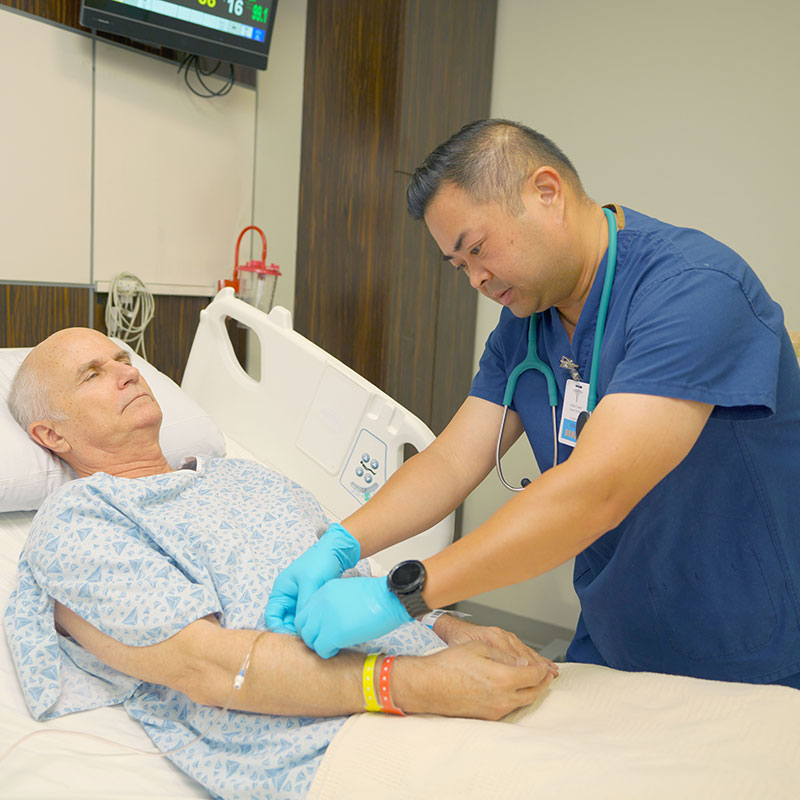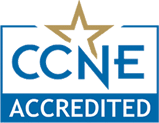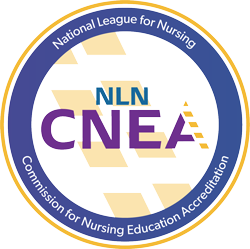Nursing



10-week terms allow for start dates throughout the year
Earn your BSN in as few as 39 months at the Accelerated program pace
Miami, Texas, LA, Orange County & Ontario
Some of our most popular BSN classes include technologically advanced simulation labs, where you’ll get the chance to work through real-life scenarios in a forgiving environment. These labs feature high-fidelity manikins that cry, sweat, and react like real patients, helping you build practical skills essential for your nursing career.
BSN classes at WCU are paired with clinical support that connects you to a diverse range of clinical partners. Our clinical advisors assist in finding placements tailored to your interests, ensuring a comprehensive learning experience that bridges classroom knowledge with real-world application.
Our BSN classes include NCLEX-focused sessions designed to help you prepare for your licensure examination and excel as a registered nurse (RN). Get individualized support, attend NCLEX bootcamps, and access resources like no-cost tutoring and a virtual library.
Receive personalized attention and support from the moment you step onto campus, to beyond graduation.

Are you interested in becoming a registered nurse so you can change people’s lives for the better? If so, you may want to consider earning a Bachelor of Science in Nursing (BSN) degree, which provides you with both the didactic learning and hands-on practice you need to prepare for the fast-paced world of patient care.
WCU’s BSN program focuses on preparing nurses who are life-long learners and critical thinkers. The curriculum integrates nursing concepts with science and humanities to build a strong foundation for clinical practice.
Benefit from WCU’s student-centric approach to education, technologically advanced simulation labs, and innovative learning tools that are designed to aid in your success.
Upon completion of the program, you will be eligible to take the NCLEX-RN licensing examination to become a registered nurse.
A BSN can prepare you for roles in hospitals, clinics, community health centers, and beyond. Your education can open doors to opportunities in patient care, education, and even leadership.
At WCU, you can choose a program pace that works for your schedule. Whether you want to go full-speed in your studies or complete your program at a slower pace to balance school with your other responsibilities, we have an option for you.
Additional program paces available at the Miami campus.
On-Campus
120 Credits
39 Months
8 Semesters
This curriculum applies to students matriculating or reentering after December 1, 2022.
All science courses must have been taken within the last five calendar years, unless the student possesses a degree or advanced degree in the specific field of study for which the student is seeking transfer credit. Additional information regarding transfer credit is located in the university’s catalog under Transfer Credit policy or below.
| Category and Requirements | WCU Course Requirements | Transferable / Options |
|---|---|---|
| Foundational Course | FYS 001 (0): First Year Seminar (only offered at Los Angeles and Ontario prior to Spring II 2024)
FHE 100 (3): Foundations of Higher Education (offered at all Campuses; Los Angeles and Ontario Campuses starting Spring II 2024) |
Non-transferable |
| A. Written Communication (6 Semester Credits) | * ENGL 140 (3): Written Communication I * ENGL 240 (3): Written Communication II |
Equivalent to ENGL 140 Equivalent to ENGL 240 |
| B. Oral and Interpersonal Communications (3 Semester Credits) |
*SPCH 142(3): Oral Communication | Equivalent to SPCH 142 |
| C. Critical Thinking and Ethical Reasoning (3 Semester Credits) |
*PHIL 341(3): Critical Reasoning | Equivalent to PHIL 341 |
| D. Quantitative Literacy (6 Semester Credits) |
MATH 108(3): College Mathematics I MATH 211(3): Statistics |
Equivalent to MATH 108
Equivalent to MATH 211 |
| E. Social and Behavioral Sciences Awareness (6 Semester Credits) |
*PSYC 160(3): Psychology *PSYC 290(3): Life Span Psychology |
Equivalent to PSYC 160 Equivalent to PSYC 290 |
| F. Historical, Cultural, and Aesthetic Recognition (3 Semester Credits) |
* HUM 370 (3): Cultural Pluralism | Equivalent to HUM 370 |
| G. Scientific Reasoning (16 Semester Credits) |
ANAT 260(4): Human Anatomy PHYS 261(4): Human Physiology CHEM 280(4): Chemistry MICR 290(4): General Microbiology |
|
| General Education Capstone (3 Semester Credits) |
CAPS 401(3): General Education Capstone (only offered at Los Angeles, Ontario Campuses prior to Spring II 2024) |
Non-transferable |
| A minimum of 46 credits is required for graduation. | ||
| General Education within the Area of Study | ||
| PATH 370 | Pathophysiology | 3 |
| PHIL 434 | Medical Ethics and Issues | 3 |
| Total Credit Hours: | 6 | |
| Core Nursing Courses | ||
| NURS 100 | Fundamentals of Nursing | 3 |
| NURS 101L | Fundamentals of Nursing Skills Lab | 2 |
| NURS 110 | Introduction to Professional Nursing | 2 |
| NURS 120 | Introduction to Medical Surgical Nursing | 3 |
| NURS 121L-A | Introduction to Medical Surgical Nursing Practicum | 2 |
| NURS 121L-B | Introduction to Medical Surgical Nursing Practicum – On-Campus | 1 |
| NURS 180 | Pharmacology | 3 |
| NURS 190 | Physical Assessment | 2 |
| NURS 201 | Medical Surgical Nursing-Promoting Wellness | 3 |
| NURS 211L | Medical Surgical Nursing | 3 |
| NURS 222 | Mental Health/Psychiatric Nursing: Promoting Wellness in the Mentally Ill | 3 |
| NURS 223L | Mental Health/Psychiatric Nursing: Promoting Wellness Practicum | 2 |
| NURS 225 | Nutrition in Health and Disease | 3 |
| NURS 306 | Expanding Family and Community (OB) | 2 |
| NURS 307 | Developing Family and Community (PEDS) | 2 |
| NURS 316L-A | Expanding and Developing Family and Community Practicum (OB) | 1.5 |
| NURS 317L-A | Developing Family and Community Practicum (PEDS) | 1.5 |
| NURS 340 | Public Health Nursing | 3 |
| NURS 342L | Public Health Nursing Practicum | 2 |
| NURS 350 | Research in Nursing | 3 |
| NURS 420 | Principles of Leadership and Management | 3 |
| NURS 431 | Disaster Management | 2 |
| NURS 440 | Issues and Trends in Nursing | 3 |
| NURS 480 | Advanced Medical Surgical Nursing: Promoting Wellness Practicum | 3 |
| NURS 481L | Advanced Medical Surgical Nursing: Promoting Wellness Practicum | 3 |
| NURS 493* | Integration of Nursing Concepts | 3 |
| NURS 497 | Nursing Capstone | 1 |
| NURS 498L | Integration of Nursing Practices | 3 |
| Total Credit Hours: | 68.0 | |
| Program Credit Distribution | ||
| General Education Semester Credits | 46.0 | |
| General Education within the Area of Study | 6.0 | |
| Core Nursing Courses | 68.0 | |
| Total Program Semester Credits | 120.0 | |
We know school is a substantial commitment. At WCU, we want to equip you with all the information you need to make the right decision for your future. For a breakdown of the BSN program costs, visit the BSN program page for the campus you wish to attend.
We offer several BSN program financial aid options — including scholarships, grants, and loan access — to help support you through your studies. For more information about your financial support options, visit our financial aid page.
To review the admission requirements for WCU’s BSN program, please visit the BSN program page for the campus you plan to attend:
New academic terms begin, on average, every 10 weeks. The number of semesters required for your program depends on the program pace you choose. For the most updated list of term start and completion dates, view the Academic Calendar.
Our BSN classes are designed to provide a balance of theoretical knowledge and hands-on experience, preparing you for the real-world challenges of patient care. Each course is part of a comprehensive curriculum that builds the skills and confidence needed to excel in the nursing field.
BSN classes at WCU include:
With a mix of classroom and hands-on learning, WCU’s BSN classes help prepare you for a fast-paced nursing environment.



At WCU, our goal is to build both the skills and confidence required in the nursing field. Practice using high-fidelity manikins that cry, sweat, and react like real patients. Coupled with hands-on clinical experiences, our simulations give students the opportunity to master foundational skills and graduate with confidence.
Our BSN students experience a range of patient care situations from routine to emergency. During simulation sessions, each student independently practices the functions of a registered nurse. The simulation labs at West Coast University use a full range of scenarios at all levels of the core nursing program:

WCU is dedicated to building long-term clinical relationships and hospital affiliations that offer students a world of options and meaningful clinical experiences.
We have coordinators of clinical relations who support students by facilitating clinical site and preceptor selection, helping streamline approvals, and assisting with compliance tracking. Our Clinical Placements team also provides coaching calls for students who need guidance on how to make their clinicals a success.

Passing the National Council Licensure Examination (NCLEX) is a critical milestone for all nurses. That’s why WCU helps prepare you every step of the way.
As a BSN student, you have access to:

“WCU helped prepare us for the NCLEX by providing an adequate test environment, providing us with opportunities to take proctored tests that simulate the NCLEX and to test our nursing knowledge in those tests.”
– Stephanie P., BSN ’21*

“West Coast prepares you unlike any other school I have seen for the NCLEX.”
– Leslie G., BSN ’18*
WCU graduates get to enjoy support from our Career Services team.2 Starting when you’re a student, through graduation, and beyond, you’ll have access to individualized career advice, professional development workshops on topics like resume writing and interview preparation, help finding job leads, assistance connecting with industry recruiters, and more.
Once you receive your licensure as a registered nurse, you will have various options to choose from for your career path. According to the U.S. Bureau of Labor Statistics, a registered nurse usually works with physicians and other healthcare specialists. Additionally, they may be charged with overseeing licensed practical nurses, nursing assistants, and home health aides.3
The largest employers of registered nurses (according to the Bureau of Labor Statistics) are:
The Career Services team can help you find job opportunities that meet your goals!

Dr. Piazza has been working in the university since 2009. Her past roles included Faculty; Campus Associate Dean of Nursing, Academics; Campus Dean of Nursing; and Associate Dean, College of Nursing. Most recently, she has been appointed to the position of Dean, College of Nursing.
She has a Doctor of Philosophy in Nursing from the University of San Diego, a Master of Education from Cambridge College, and a Bachelor of Science in Nursing from the University of California, Los Angeles.
With a commitment to community service, Dr. Piazza is a Commissioner for the Sister Cities Commission of Anaheim. And has previously served as Commissioner, Orange County Human Relations, and Board Member for the School Nurses of California Foundation.
WCU’s BSN program combines both didactic theory courses and clinical experience to ensure that you receive a well-rounded and practical education. In addition to learning the best practices of evidence-based care in the classroom, you will get to put it to practice both in our industry-current simulation centers and in your clinical rotations so you can enter real-world nursing situations with confidence. We also provide you with extensive resources to help you properly prepare for your licensure exam.
WCU’s Bachelor of Science in Nursing (BSN) degree can be earned in 39 months (8 semesters) at the Accelerated pace. The Miami campus offers an Evening and Weekend pace, which can be completed in 44 months (9 semesters), and a Working Professional pace, which can be completed in 54 months (11 semesters). A total of 120 semester credits are required to complete the BSN program.
We offer multiple program paces so you can choose the timeline that works best for you. Taking fewer courses per term through the Working Professional pace may be your best option if you have a limited schedule due to work. Some WCU campuses also offer an Evening and Weekend program to further accommodate working students. Speak with a WCU admissions advisor to learn more about your options.
Yes. WCU’s BSN program is designed for those seeking to become a registered nurse (RN) regardless of the undergraduate degree they currently hold. Students can go from a non-nursing BS to BSN degree and take the NCLEX-RN with confidence — in as little as 39 months.
WCU offers a variety of master’s programs for those with a BSN degree. One option is to pursue a Master of Science in Nursing (MSN). At WCU, MSN students can choose from a number of specialization tracks, such as the family nurse practitioner track, nurse leader track, or nurse educator track, just to name a few. If you are licensed as a registered nurse and you want to skip the step of getting an BSN first, you can choose WCU’s RN to MSN program.
Additional options at WCU include a Master of Business Administration (MBA), a Master of Health Administration (MHA), or a Master of Public Health.
“Registered nurse” is a professional title that indicates that someone has passed the National Council Licensure Examination for registered nurses (NCLEX-RN). A Bachelor of Science in Nursing, or BSN, is an undergraduate degree from an accredited institution.
While a BSN is not required for licensure, a prospective RN may pursue this degree to further their education, prepare them for a career in nursing, and create a pathway to future nursing specialization (which is achieved through a master’s degree).
You can receive financial aid as long as you meet the eligibility requirements. Some of the various types of aid that may be available include student loans, grants, scholarships, federal work-study, employer tuition reimbursement, and more. Visit our financial aid page for information about your general financial aid options. You can also learn about institutional scholarships available at our Undergraduate On-Ground Scholarships and Grants page on our online catalog.
With a focus on student-centric learning, we believe in giving our students support from start to finish, and even beyond graduation. At WCU, you will be assigned to a Student Success advisor and a coordinator of clinical relations, and you will have access to no-cost tutoring. Additionally, you will work with highly engaged instructors and other faculty members whom you can call or text directly through our Remind app.

The baccalaureate degree program in nursing, master’s degree program in nursing, Doctor of Nursing Practice program, and post-graduate APRN certificate program at West Coast University are accredited by the Commission on Collegiate Nursing Education 655 K Street, Suite 750, Washington DC 20001, (202) 877-6791 (www.ccneaccreditation.org).

The West Coast University Bachelor’s Degree in Nursing Program (System) holds initial accreditation from the National League for Nursing Commission for Nursing Education Accreditation (NLN CNEA), located at 2600 Virginia Avenue, NW, Washington, DC 20037. 202-909-2487.
1 American Association of Colleges of Nursing, “Employment of New Nurse Graduates and Employer Preferences for Baccalaureate-Prepared Nurses,” October 2022
2 WCU provides career guidance and assistance but cannot guarantee employment.
3 Bureau of Labor Statistics, U.S. Department of Labor, Occupational Outlook Handbook, Registered Nurses, “What Registered Nurses Do,” Updated Sept. 8, 2022
4 Bureau of Labor Statistics, U.S. Department of Labor, Occupational Outlook Handbook, Registered Nurses, “Work Environment,” Updated Sept. 8, 2022
*The views and opinions expressed are those of the individuals and do not necessarily reflect the beliefs or position of the school or of any instructor or student.
Financial aid and scholarships are available for those who qualify.
Additional Resources:
Military Training or Experience